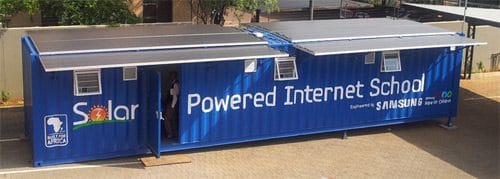
After commenting on Simeon's article I looked for news on technology and education in Africa and this one on solar-powered internet schools in Boksburg (South Africa) caught my eye.
As part of its social responsibility programme, Samsung try to address Africa’s electrification limits by “Positively impacting lives”. The solar-powered, mobile and completely independent classroom is geared at increasing accessibility to education and connectivity across Africa. It is designed particularly for use in remote rural areas with limited or no access to electricity. The solar panels are made of rubber and can power the classroom’s devices for up to 9 hours daily.
[JV]Having recently re-visited South Africa, possibly the most developed of the sub-saharan African nations, I remain shocked that - other for reasons of energy efficiency - the country still has areas where these types of projects make sense. But, as the article continues, South Africa can export its insights to the rest of the continent...
[JV]Having recently re-visited South Africa, possibly the most developed of the sub-saharan African nations, I remain shocked that - other for reasons of energy efficiency - the country still has areas where these types of projects make sense. But, as the article continues, South Africa can export its insights to the rest of the continent...
The Solar Powered Internet Schools model addresses one of Africa's largest economic challenges - electrification. On average, less than 25% of rural areas on the continent benefit from electricity, resulting in isolated communities with limited access to education and connectivity both of which are key to fast-tracking a nation's development.
Each classroom is fitted with an electronic E-board and different Samsung notebooks and netbooks, including the solar powered netbooks and Galaxy tablets for student and teacher interface, all of which are optimised for use in a solar powered environment. According to KK Park, president and CEO of Samsung Electronics Africa
"The amount of power generated by the schools each day means they can be used beyond the traditional school day as an adult education centre in the afternoons or a community centre over weekends. Our goal was to create an environment that would facilitate learning for whole communities in remote areas that otherwise don't have access to education tools or internet connectivity."

All over Africa, similar initiatives are springing up. This container being transported along a remote Zambian road holds one of three ZubaBox internet cafes that technology charity Computer Aid International has set up in Kenya and Zambia since 2010. Zuba is the word for Sun in Nyanja - a language spoken in Zimbabwe, Malawi and Southern Zambia - the area where the first ZubaBox was deployed to harness power from the sun and provide internet connectivity for the community.
The ZubaBox has been designed to help rural communities access the IT and internet, which can have a huge impact on poverty reduction. Additionally, learning IT skills at school means children will be able to gain better paid employment in the future. In 2008, the UN found that there were only 5.6 internet users in Zambia per 100 people, compared to nearly 80 internet users per 100 people in the UK.
The internet cafes, the first of which was installed in early 2010, have brought internet connectivity to communities in sub-Saharan Africa in an effort to boost IT skills, education and day-to-day communications in remote rural areas.
[JV]: As I said in an earlier comment, it is not so much the access to technology in itself that is important, but the access to knowledge that such technology brings. In that sense, it does not have to be the latest gadget that will power the knowledge society's first steps in Africa, but old, often discarded pc's that organisations such as Computer Aid refurbish for a 'second life'. And that's I Second Life I can wholeheartedly support!
What an inspiring article! I wish people would pay more attention to energy saving products in general. The idea of a solar-panel based school could easily save the electrification problem on that continent.
ReplyDeleteNice stuff dear. Thanks for sharing it. I have something to share with you. Check it. Solar panel installation company & How solar system works
ReplyDelete